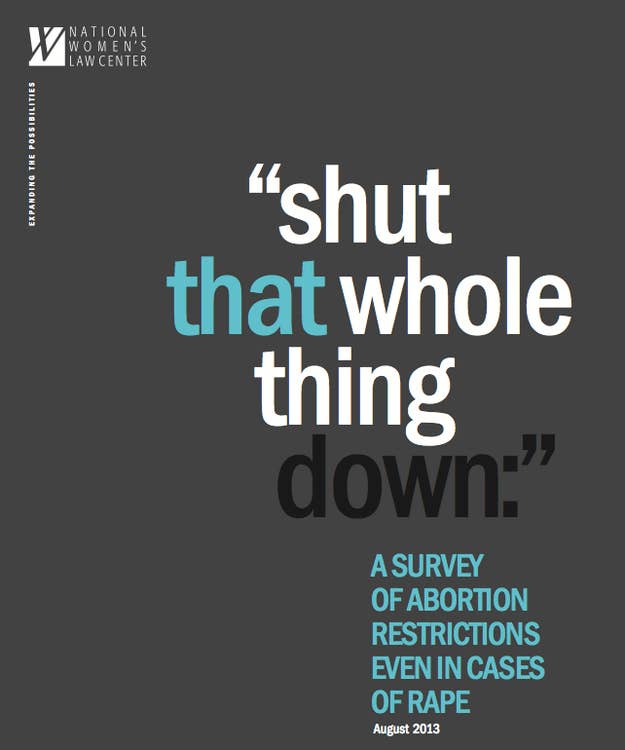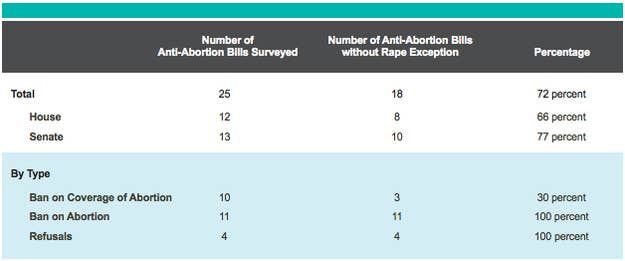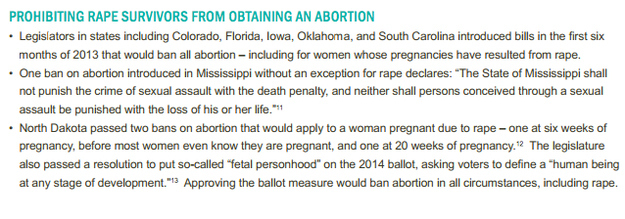
"When it's a legitimate rape," Todd Akin said in August, 2012, "the female body has ways to try to shut that whole thing down."
The statement garnered enough blowback to cost Todd Akin the election, but a new National Women's Law Center (NWLC) report titled Shut That Whole Thing Down: A Survey Of Abortion Restrictions Even in Cases of Rape, issued one year after Akin's statement, shows that nationwide restrictions continue to deny women access to abortions, even in rape cases.
The NWLC looked at legislation introduced in Congress in the first six months of 2013 and found anti-abortion bills are still being debated and passed in the context of the false beliefs Akin and other politicians expressed last year.
In the first half of 2013, 72 percent of the anti-abortion bills introduced did not include an exception for rape. At least 16 states have considered bills that would require a woman whose pregnancy results from rape to undergo ultrasounds and listen to the fetal heartbeat.
The NWLC report additionally finds:
86 percent (235) of the 273 provisions that politicians introduced in state legislatures to restrict a woman's access to abortion apply to a woman whose pregnancy resulted from rape.
71 percent (27) of the 38 state provisions restricting women's access to abortion enacted by the states apply to a woman whose pregnancy resulted from rape.
72 percent (18) of the 25 bills introduced in Congress to restrict a woman's access to abortion apply to a woman whose pregnancy resulted from rape.
"These restrictions are an insult to women and their health needs," says NWLC Co-President Marcia D. Greenberger.
Federal Legislation, By The Numbers

State Legislation, By The Numbers


The NWLC clarifies how they define "restriction":
These restrictions range from forcing a woman who has been raped to carry her pregnancy to term, to denying her insurance coverage for an abortion, to forcing her to undergo a physically invasive ultrasound or listen to the fetal heartbeat, to allowing hospitals to refuse to provide her an abortion, to forcing her to receive inaccurate and biased information designed to dissuade her from having an abortion.
The results of the survey do not reflect the full scope of abortion restrictions introduced and enacted at the state and federal level. The survey did not consider bills where a rape exception would not be pertinent, such as abortion facility requirements. Although not included in this survey, these bills cause great harm to women, because they are intended to shut down virtually all clinics, and therefore make abortions unavailable in all circumstances, including for pregnancies arising from rape.
The public outrage that followed Akin's August, 2012 remarks came from Republicans and Democrats alike. Mitt Romney said "we cannot defend him" and Massachusetts Senator Scott Brown (R) called Akin's comments "outrageous, inappropriate and wrong." Obama even made a public statement (below), in which he claimed "rape is rape."
While many Republicans moved quickly to disassociate themselves from Akin, others either supported him or expressed similar sentiments. Several weeks after the controversy Rep. Todd Smith (R - Pa.) compared pregnancy caused by rape to "having a baby out of wedlock," and in January, 2012 Rick Santorum was criticized for saying that that women who got pregnant from rapes had "the gift of human life," and that "rape victims should make the best of a bad situation."
The National Women's Law Center report concludes that legislation continues to be introduced and enacted based on these beliefs, and that that "one year later, this debate has not been shut down." The full report is available here.

